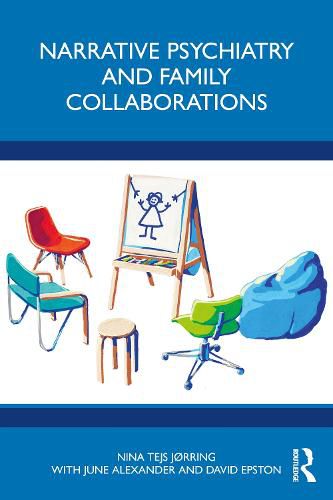Readings Newsletter
Become a Readings Member to make your shopping experience even easier.
Sign in or sign up for free!
You’re not far away from qualifying for FREE standard shipping within Australia
You’ve qualified for FREE standard shipping within Australia
The cart is loading…






Narrative Psychiatry and Family Collaborations is about helping families with complex psychiatric problems by seeing and meeting the families and the family members, as the best versions of themselves, before we see and address the diagnoses.
This book draws on ten years of clinical research and contains stories about helping people, who are heavily burdened with psychiatric illnesses, to find ways to live a life as close as possible to their dreams. The chapters are organized according to ideas, values, and techniques. The book describes family-oriented practices, narrative collaborative practices, narrative psychiatric practices, and narrative agency practices. It also talks about wonderfulness interviewing, mattering practices, public note taking on paper charts, therapeutic letter writing, diagnoses as externalized problems, narrative medicine, and family community meetings. Each chapter includes case studies that illustrate the theory, ethics, and practice, told by Nina Jorring in collaboration with the families and colleagues.
The book will be of interest to child and adolescent psychiatrists and all other mental health professionals working with children and families.
$9.00 standard shipping within Australia
FREE standard shipping within Australia for orders over $100.00
Express & International shipping calculated at checkout
Narrative Psychiatry and Family Collaborations is about helping families with complex psychiatric problems by seeing and meeting the families and the family members, as the best versions of themselves, before we see and address the diagnoses.
This book draws on ten years of clinical research and contains stories about helping people, who are heavily burdened with psychiatric illnesses, to find ways to live a life as close as possible to their dreams. The chapters are organized according to ideas, values, and techniques. The book describes family-oriented practices, narrative collaborative practices, narrative psychiatric practices, and narrative agency practices. It also talks about wonderfulness interviewing, mattering practices, public note taking on paper charts, therapeutic letter writing, diagnoses as externalized problems, narrative medicine, and family community meetings. Each chapter includes case studies that illustrate the theory, ethics, and practice, told by Nina Jorring in collaboration with the families and colleagues.
The book will be of interest to child and adolescent psychiatrists and all other mental health professionals working with children and families.